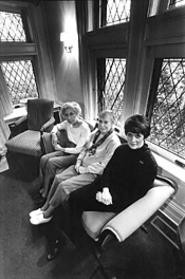"That's lovely," they say. "How charming." "No, it won't be any trouble a'tall." Between sips of lemonade at their afternoon luncheons, they discuss their children, world travels, and Kafka. Their meeting place, a gabled Cleveland Heights mansion with fresco ceilings and art-glass windows, makes for a fine refuge.
Founded in 1898, the social, intellectual, and philanthropic sisterhood began as a salon for wealthy women who went away to school for four years, only to return home to a vast intellectual desert, where they were expected to spend the rest of their lives in idle chitchat. Membership was limited to ladies who'd graduated from an "approved" four-year college. Otherwise, though they might be smart, they were out of luck.
Despite the restrictions, more than 500 women belonged to the club in its 1950s heyday. Parking was such a problem, they had to pave over the formal gardens to make more room. "It was terribly crowded," says Gloria Hastings, a former librarian who warmly greets guests. "That was the era when women had time on their hands."
Many of the current members date back to the Eisenhower administration. They know the rooms of peppermint-striped wallpaper, fresh flowers, and portraits of Victorian ladies better than they know their own rose bushes.
In recent decades, however, the rolls have steadily declined. A few years ago, faced with not having enough people for a hand of euchre, let alone a winter formal, the women decided to embark on the club's first-ever membership drive.
Let's liven things up, they said. Keep the duplicate bridge and music appreciation, but offer a little line dancing and tai chi, too. And what the heck -- let's change our membership requirements. You don't have to graduate from a blueblood university like Oberlin College. Tri-C or Virginia Marti College of Fashion will do just fine. You can even be a man.
But they were all so demure, nobody wanted to come right out and ask other people to join. "A lot of us are too timid, you know?" says Hastings. "It's too bad, because I think a lot more people would be interested in doing this if they knew."
Enter the one audacious soul in their ranks, a prison instructor named Thelma Pierce. "Let me put it this way," says Pierce, who became membership chairwoman. "I don't get intimidated easily."
Just by being her blunt, bad self, Pierce recruited about 20 new members. She signed up a blind woman by inviting her to the music appreciation group, where her seeing-eye dog thumped her tail to the symphonies. "She loved Mozart," Pierce says of the dog. "She was just keeping perfect time."
Pierce joined the College Club in 1997, mostly because she liked the idea of having a civilized luncheon once a week. Working at the jail, she was in a veritable lunch ghetto, eating her sandwich and piece of fruit alone in a windowless classroom.
Being waited on in a chandeliered hall, surrounded by the conversations of successful women, was a welcome break. The other ladies even let her give little talks on prison reform. They brought calendars for her to take to the prisons, so the inmates could cross off the dates they'd served.
It was the least the College Club could do -- after all, Pierce had inspired even the most delicate flowers to do a little recruiting, driving up the membership to more than 200. Most hit up their own daughters. High school counselor Pat Simpson, for instance, started coming because her mom made her. "I went in kicking and screaming," she says. Only recently, when her mom became terminally ill, did Simpson really start attending functions. She joined the art guild, playing hooky from work once a week so she could paint with her elders.
"My heart's more here now," she says, adding a dash of crimson to her work-in-progress. "There are some dear people. There's one lady, I love her. She's dying now. She'd come over and say, 'Get a larger brush! You need a larger brush!' So this is a brush for Margaret."
At first, Simpson, a self-described chatterbox, was assigned a seat in social Siberia. "I talked too much," she explains. "But I learned." Once she got the hang of talking less and painting more, her elders "promoted" her to a better spot.
Some of the women are quite accomplished in the art world. In her youth, Audra Rose worked as a fashion illustrator for a New York merchandising house. She'd attend shows and sketch the latest collections for 27 department stores, "letting them know what was hot." After six years, she got married and pregnant, and had to quit.
"It broke my heart," she says. "Back in those days, most women were on a treadmill. They couldn't make enough money to be on their own and were forced into marriage. But I always loved art.
"And I'm very fond of the women in here. They don't have a meanness of spirit you sometimes run into."
Susan Crane, a wisecracking woman barely bigger than a thimble, is busy making a grandfather for her collage family. "Grandpod," as she calls him, has a necktie of parsnips (not the real thing, but pictures cut from a seed catalog), a green tomato head, and raisins for eyes.
"I did the grandmother in 1988," she remarks, taking a moment to assess her work. "It took me 13 years to give her a husband."
Hastings says that ever since she became a widow, the College Club has been a godsend. "Because all of a sudden, you're all by yourself. And I don't have any kids. Any relatives at all. Everyone's very caring, very concerned, because a lot of them have gone through this."
After her husband died, her married friends didn't come around much anymore. "It's not that they're mad at you," she says. "It just doesn't work out." But once she was ready to strike up new friendships, she had enough prospects to fill a mansion.














